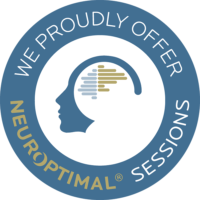A frequent conversation we have with our clients early on in the therapy process is around a person’s history of exposure to trauma that could be fueling maladaptive thoughts, actions, emotions, and bodily sensations. I am often told by clients, “I don’t think about this experience, so it must not bother me”. The way to truly know if a “small t” trauma is bothering us is to recall the memory and the disturbing moment associated with it and find out your nervous system is still activated today. If you experience activation, meaning upsetting emotions, body sensations, or thoughts, that means the memory is still maladaptively stored in the brain. A processed memory holds no activation, yet it may cause some sadness, or grief to think about. That is way different than an unhealed trauma reaction.
When we get overwhelmed or “triggered”, 10 to 20 percent of how we feel is based on the present moment. The other 80 to 90 percent is fueled by the unhealed trauma reaction.
As we discussed in our earlier article, “small t” traumas can include events like feeling embarrassed or ashamed about a certain situation. All of these experiences are important in our work. We believe the goal of our work is to process any maladaptively stored memory networks so we can fully be ourselves and live in the present.
Because we are trauma-informed therapists, when clients come to us with symptoms of depression and anxiety, we help them to understand what trauma is and what past situations may have been maladaptively stored in the brain to contribute to their current symptoms. Not everyone who has experienced trauma has PTSD. A person could go through an upsetting situation, or series of upsetting situations and feel depressed, or anxious, or feel like they have difficulty managing their emotions in general.
“Small t” traumas are at the root of many of our issues. For example, fear of failure, fear of success, performance anxiety, creative blocks (e.g. writers’ block) often stem back to “small t” traumas.



